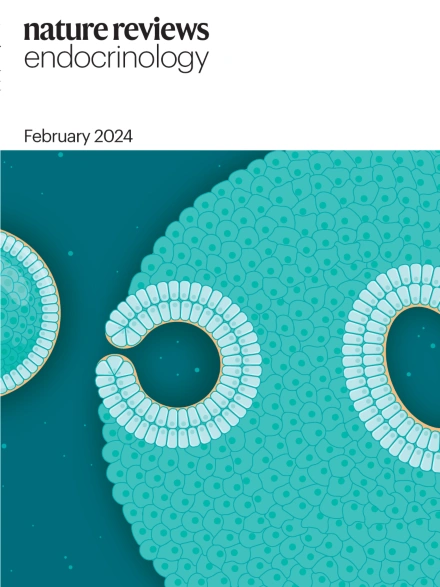Liver-specific actions of GH and IGF1 that protect against MASLD
IF 31
1区 医学
Q1 ENDOCRINOLOGY & METABOLISM
引用次数: 0
Abstract
Metabolic dysfunction-associated steatotic liver disease (MASLD; also known as nonalcoholic fatty liver disease) is a chronic condition associated with metabolic syndrome, a group of conditions that includes obesity, insulin resistance, hyperlipidaemia and cardiovascular disease. Primary growth hormone (GH) deficiency is associated with MASLD, and the decline in circulating levels of GH with weight gain might contribute to the development of MASLD. Raising endogenous GH secretion or administering GH replacement therapy in the context of MASLD enhances insulin-like growth factor 1 (IGF1) production and reduces steatosis and the severity of liver injury. GH and IGF1 indirectly control MASLD progression by regulating systemic metabolic function. Evidence supports the proposal that GH and IGF1 also have a direct role in regulating liver metabolism and health. This Review focuses on how GH acts on the hepatocyte in a sex-dependent manner to limit lipid accumulation, reduce stress, and promote survival and regeneration. In addition, we discuss how GH and IGF1 might regulate non-parenchymal cells of the liver to control inflammation and fibrosis, which have a major effect on hepatocyte survival and regeneration. Development of a better understanding of how GH and IGF1 coordinate the functions of specific, individual liver cell types might provide insight into the aetiology of MASLD initiation and progression and suggest novel approaches for the treatment of MASLD. This Review discusses the roles of growth hormone (GH) and insulin-like growth factor 1 (IGF1) signalling in reducing the risk of metabolic dysfunction-associated steatotic liver disease (MASLD). Sex-dependent differences in MASLD susceptibility and the effects of GH and IGF1 on hepatocytes and non-parenchymal cells are considered.


GH 和 IGF1 对肝脏的特异性作用可防止 MASLD
代谢功能障碍相关性脂肪性肝病(MASLD,又称非酒精性脂肪肝)是一种与代谢综合征相关的慢性疾病,代谢综合征包括肥胖、胰岛素抵抗、高脂血症和心血管疾病。原发性生长激素(GH)缺乏症与 MASLD 有关,而 GH 循环水平随体重增加而下降可能会导致 MASLD 的发生。提高内源性 GH 分泌或对 MASLD 患者进行 GH 替代治疗可促进胰岛素样生长因子 1(IGF1)的产生,减轻脂肪变性和肝损伤的严重程度。GH 和 IGF1 通过调节全身代谢功能间接控制 MASLD 的进展。有证据支持 GH 和 IGF1 在调节肝脏代谢和健康方面也有直接作用的观点。本综述重点探讨 GH 如何以性别依赖的方式作用于肝细胞,以限制脂质积累、减轻压力并促进存活和再生。此外,我们还讨论了 GH 和 IGF1 如何调节肝脏的非实质性细胞以控制炎症和纤维化,这对肝细胞的存活和再生有重大影响。更好地了解 GH 和 IGF1 如何协调特定的单个肝细胞类型的功能,可能有助于深入了解 MASLD 发病和进展的病因,并为治疗 MASLD 提出新的方法。
本文章由计算机程序翻译,如有差异,请以英文原文为准。
求助全文
约1分钟内获得全文
求助全文
来源期刊

Nature Reviews Endocrinology
医学-内分泌学与代谢
CiteScore
42.00
自引率
0.70%
发文量
158
审稿时长
6-12 weeks
期刊介绍:
Nature Reviews Endocrinology aspires to be the foremost platform for reviews and commentaries catering to the scientific communities it serves. The journal aims to publish articles characterized by authority, accessibility, and clarity, enhanced with easily understandable figures, tables, and other visual aids. The goal is to offer an unparalleled service to authors, referees, and readers, striving to maximize the usefulness and impact of each article. Nature Reviews Endocrinology publishes Research Highlights, Comments, News & Views, Reviews, Consensus Statements, and Perspectives relevant to researchers and clinicians in the fields of endocrinology and metabolism. Its broad scope ensures that the work it publishes reaches the widest possible audience.
 求助内容:
求助内容: 应助结果提醒方式:
应助结果提醒方式:


